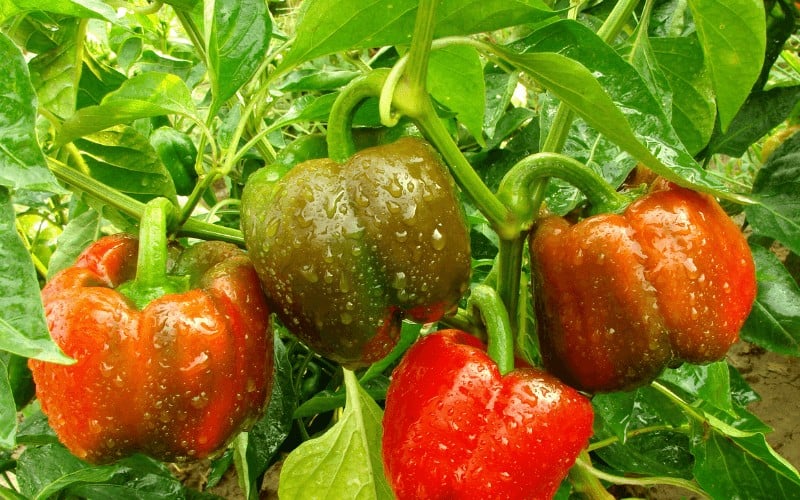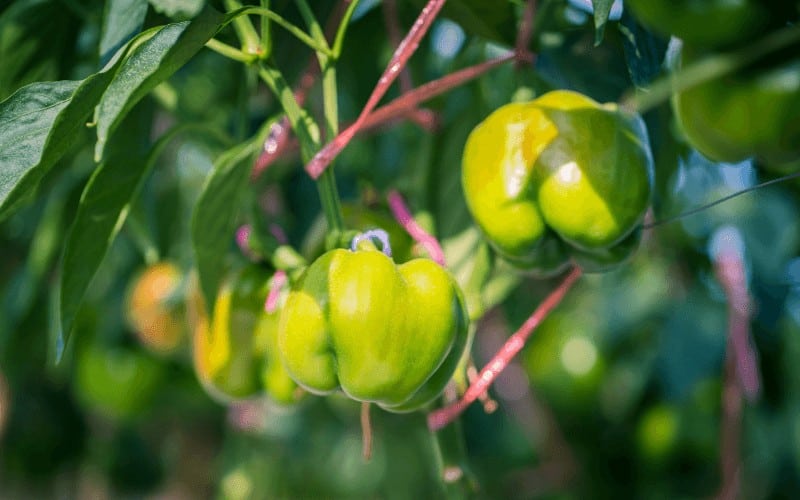Bell peppers are a regular component of a garden salad, we use it in some of our dishes to add some flavor and taste it to. But should red peppers be classified as vegetables? Or is bell pepper a fruit? Well, bell peppers are technically both. In other words, bell peppers are considered fruits in a botanical context – and vegetables in a culinary sense.
It all depends on whether you’re discussing with a botanist, who defines bell pepper botanically or a chef or nutritionist, who will probably give you the culinary definition.
Table of Contents
Is Bell Pepper A Fruit Or a Vegetable?
Also known as sweet pepper, or capsicum (in New Zealand and Australia), or a pepper (in the UK), bell pepper is a cultivar that belongs to the Capsicum annuum (chili pepper) species, which produce different colors of fruit.
Just like tomatoes or green beans, bell pepper is both vegetable and fruit. The botanical and culinary definition of fruit are different and mostly non-overlapping. In the culinary context, a fruit is usually sweet or at least citrusy or acidic.
Vegetables, on the other hand, are not sweet. That said, the culinary fruits are equally botanically fruits, but the same thing applies to lots of the culinary vegetables.
Basically, if the edible part of a plant is a stem, leaves, or root, it is almost always referred to as a vegetable.
Bell Pepper as a Fruit in Botanical Terms

A botanist would classify bell pepper botanically, which is based on its physiological attributes, such as the structure, organization, and function.
So, in botanical sense, a “fruit” is the thing that bears seed that comes out from the ovary of a flowering plant.
A botanical fruit grows from the flower of the plant and would have at least one seed. As you probably know already, bell peppers grow from the flower of the pepper plant and have tiny seeds in the middle – as such, they can be classified as fruits.
On the contrary, a “vegetable” in botanical expression has no definition but is more of a general word used for all edible parts of the plant, the leaves, roots, and the stems.
Therefore, going with the botany context, foods like strawberries, cherries, and apples can be classified as fruit, including bell peppers.
Bell Pepper as a Vegetable in Culinary Terms
A chef or nutritionist would use culinary classification that defines vegetables and fruit differently, which is primarily by how the plants are used and their flavor.
In culinary point of view, a “vegetable” generally tastes blander, has a tougher texture, and often need to be cooked in dishes such as soups, stews, or stir-fries.
While, a “fruit” tends to be either tart or sweet, has a soft texture, and is often eaten raw or in jams or desserts.
Bell peppers can be crunchy and refreshing, and can be eaten raw. Yet, bell peppers are also prepared in savory dishes such as stews or in fajitas, which is why bell peppers are usually classified as vegetables.
Culinary Vs Botanical Classification Of Pepper

So, why are bell peppers classified in two different ways, even though it’s quite confusing? Well, there’s a reason for the two definitions.
The botanical classification, for instance, is useful for a botanist that wants to find the origins of peppers. It will help them understand different varieties of peppers, or know how to grow and harvest different species of the plant.
Similarly, the general public, chefs, and nutritionists will find the culinary definition more useful because the foods that belongs to the same botanical family may not necessarily have the same nutritional mixtures.
For instance, watermelons, cantaloupe melons, cucumbers, pumpkins, and butternut squash are all members of the same botanical family; however, they have different nutritional compositions.
That said, other botanical fruits that are considered to be vegetables in the culinary context include, olives, sweetcorn, pumpkin, avocado, tomato, cucumber, green peas, aubergine, chili, etc.
Related Posts:
Conclusion
Is bell pepper a fruit or a vegetable? I bet you already know the answer to this question.
Bell peppers are often prepared in soups, stews, or salads, even though they’re botanically a fruit. This is why they are usually seen as a vegetable from a culinary angle.
So, when next someone asks you if bell peppers or peppers, in general, is a vegetable or fruit, you need to understand the angle they’re coming from before giving them the answer. But overall, ball peppers are both fruits and vegetables.




